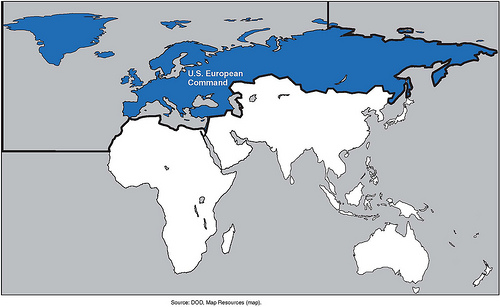
From Luke Coffey, Heritage Foundation: There has been stiff opposition from various corners in the U.S. to the continued presence of U.S. forces in Europe.
For opponents of U.S. forces in Europe, their argument stems from the false assumption that the troops are there to protect Europeans. By extension, it is therefore believed that the U.S. taxpayer is subsidizing the defense of wealthy Europeans who have decided to cut their own defense expenditure for the benefit of a bloated welfare state. . . .
While most of the opposition against U.S. forces in Europe is based on misconceptions, there are legitimate concerns on the U.S. side of the Atlantic about the ever-decreasing levels of defense spending in Europe. This frustration has manifested itself in the debate about U.S. forces in Europe.
As an intergovernmental security alliance, NATO is only as strong as its member states. Of NATO’s 28 members, 26 are European. European countries collectively have more than two million men and women in uniform, yet by some estimates, only 100,000—a mere 5 percent—of them have the capability to deploy outside national borders.
In 2012, just four of the 28 NATO members—the United States, Estonia, Britain, and Greece—spent the required 2 percent of gross domestic product (GDP) on defense. France fell below the 2 percent mark in 2011. The lack of defense investment by Europeans since the end of the Cold War and the subsequent dependence on the U.S. have planted the seed of discontent among U.S. lawmakers. . . .
The commonly held belief that U.S. forces are in Europe to protect European allies from a threat that no longer exists is wrong. In fact, forward basing U.S. troops in Europe is just as important now as it was during the Cold War, albeit for different reasons.
U.S. bases in Europe provide American leaders with flexibility, resilience, and options in a dangerous multipolar world. The huge garrisons of American service personnel in Europe are no longer the fortresses of the Cold War, but the forward operating bases of the 21st century. This is why force reductions in Europe are a concern.
There are strong economic, political, and geographical reasons to keep a large, robust, and capable U.S. military force in Europe. The geography of the U.S. European Command shows why the region matters. Just look at EUCOM’s area of responsibility: It has physical borders with Russia, the Arctic, Iran, Asia Minor, Syria, the Caspian Sea, and North Africa and the Middle East. Most of these areas have long histories of instability and a potential for future instability that could directly impact the security interests and economic well-being of the United States and its allies.
To the south of Europe, from the eastern Atlantic Ocean to the Middle East and up to the Caucasus is an arc of instability. This region is experiencing increasing instability from demographic pressures, increased commodity prices, interstate and intrastate conflict, tribal politics, competition over water and other natural resources, religious tension, revolutionary tendencies, terrorism, nuclear proliferation, and frozen conflicts. This region also has some of the world’s most vital shipping lanes, energy resources, and trade choke points. . . .
Then there is the capacity-building argument. A capable and militarily strong NATO is in America’s interest. NATO is only as strong as its member states, which is why joint training between U.S. forces and our allies is vital to keeping NATO a strong alliance.
Preparing the militaries of European allies to deploy outside of NATO’s borders offers huge benefits for the United States. In 2010, the date for which I found the most recent information, the U.S. carried out 33 major multinational training exercises involving 50,000 troops from 40 countries in Europe. Many of these training exercises were to prepare European allies for deployments to Afghanistan.
Approximately 80 percent of the countries with forces deployed in Afghanistan are European. This is simple: If these European troops were not in Afghanistan, the U.S. would need to have deployed more troops. . . .
The U.S. military presence in Europe deters American adversaries, strengthens allies, and protects U.S. interests. Whether preparing U.S. and allied troops and deploying them to Afghanistan or responding to a humanitarian crisis in the region, the U.S. can more quickly and effectively project power and react to the unexpected using its forward-based military capabilities in Europe.
Reducing this capability will only make America and her allies weaker on the world stage.
Luke Coffey is the Margaret Thatcher Fellow in the Margaret Thatcher Center for Freedom, a division of the Kathryn and Shelby Cullom Davis Institute for International Studies, at The Heritage Foundation. He delivered this lecture at the Baltic Defense College in Tartu, Estonia. (graphic: U.S. Government Accountability Office)
Image: gao%207%2016%2013%20EUCOM.jpg
